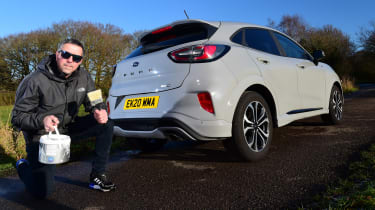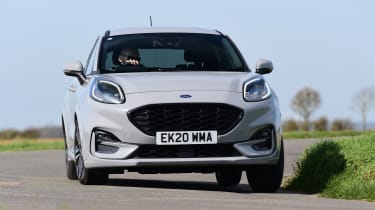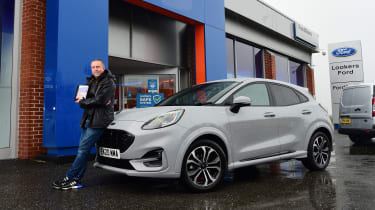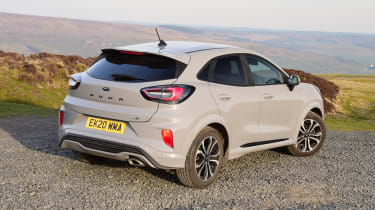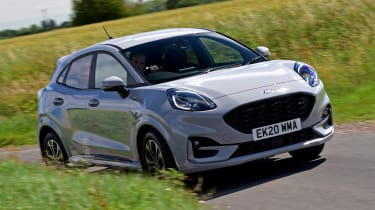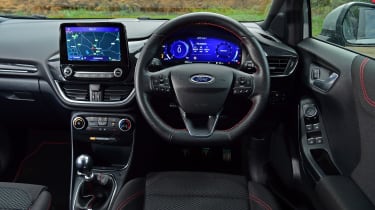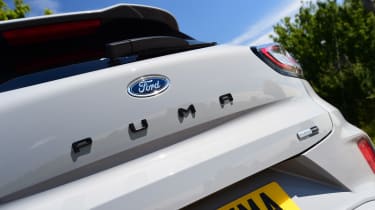Ford Puma ST-Line: long-term test
Final report: the fun-to-drive and practical Ford Puma has been a success
Verdict
The Ford Puma has proven itself to be a standout small SUV during its year-long test. It’s not as efficient as some rivals, but it has been practical family transport – and offered genuine driving enjoyment when empty roads allowed. That’s a pretty rare recipe for models in this class.
- Mileage: 29,983
- Economy: 44.3mpg
No other area of the car market has expanded over the past few years like the small SUV. There are countless models out there now, with some brands, including Ford, actually offering more than one car of this type within their own line-up. But after a full year and almost 30,000 miles, we can safely say that one of those vehicles, the Puma, really does stand out in the class.
You only need to look at the image above for the reason why. Recently we took the Puma to Thruxton, in Hampshire, for a photoshoot, only to notice other examples of the car at the race circuit’s popular driving experience centre. It turns out that Thruxton recently acquired a small fleet of Pumas to be used by the instructors as they teach the track to enthusiasts.
The Pumas in question are remarkably similar to ours, even including the same 1.0-litre Ecoboost engine and ST-Line trim. The only real difference is an extra set of pedals in the instructor’s footwell.
Used - available now
It’s a sign of how the Puma is positioned that these vehicles replaced a fleet of Fiesta ST hot hatchbacks. Because if this car has proved anything over its 12 months with us, it’s that Ford still knows how to make brilliant-handling cars. Our Puma has been at dozens of photoshoots with potential rivals – and not a single one of them has come close to matching its dynamics.
It’s that classic Ford mix, really: a chassis that just feels well controlled in corners, plus responsive steering and a gearbox that has a slightly notchy but mostly positive shift action. If you’ve driven a Fiesta in the past 10 years, the Puma will probably seem familiar and it’s just as compelling.
The EcoBoost motor plays its part in this. It’s not quite ST fast, of course, but the three-cylinder engine’s 153bhp is enough for a car of this size. It was more than quick enough to make back roads fun.
We weren’t just won over by the Puma’s on-road flair, it’s been a great family car. The rear cabin could be a little tight at times, but the boot has been big enough to cope with photography kit (and the wetbox beneath the floor has been very handy), and happy to swallow junk on trips to the local tip, or even, with the rear seats folded down, a pushbike.
Inside, the cabin always felt a comfortable and well laid-out environment to climb into after a long day out on location. I really appreciated the quick-clear heated windscreen and the heated steering wheel on colder, wetter days, and the very logical layout meant that it was all easy to use.
The same can be said for Ford’s SYNC3 infotainment system. At first I was concerned that its interface might be just a bit too blue (Ford has gone to town a bit on the corporate colour scheme). But as the miles piled on, the system’s quick responses and big on-screen buttons meant that I never had to think about it too much. I also ended up using the voice control system, and found it better than previous-gen tech.
What are the negatives? Some of the car’s interior trim wasn’t quite as durable as I’d have liked. I thought the parcel shelf was pretty flimsy from day one and it did break.
And then there’s the efficiency; in this day and age, and given the amount of long-distance runs the car has been through, an overall test average economy of just over 44mpg isn’t stellar, particularly given that this car has mild-hybrid technology. It’s a sign, we guess, that while the system does help, it’s nowhere near a replacement for a proper hybrid or plug-in. The fuel tank compounds this issue; its capacity is only 42 litres, so I ended up being placed in front of the BP garage’s ‘till confectionery’ a bit more often than I’d have liked.
I suppose that if you’re after the ultimate fuel economy, then you might find yourself edging towards the likes of the Hyundai Kona – which is available as a full hybrid or even an electric vehicle – or perhaps Toyota’s forthcoming Yaris Cross, which will likely be more frugal around town.
Neither of these options, though, will be anywhere near as rewarding as the Puma to drive. That quality may not be to everyone’s taste, admittedly, but in a packed class, it’s certainly a USP worth having, in our book.
Ford Puma ST-Line: second report
Ford Puma compact SUV checks in for first service
- Mileage: 20,516
- Economy: 43.8mpg
Until last year, life for cars on the Auto Express fleet was usually busy and demanding. We’d pile on thousands of miles travelling up and down the country – and even into mainland Europe – for events.
Yet, although almost everyone else on the Auto Express team has left their car sitting on their drive recently, rarely travelling further than the local supermarket, things haven’t changed much for me.
As Auto Express’ resident snapper, I’ve still had the opportunity to travel for work, shooting our famous road tests all over the country. The result is that, unlike other cars on the fleet, my Puma has clocked up more than 20,000 miles over the past year. And it’s been a fantastic companion.
The Puma needed its first service at 17,700 miles, with the oil-change symbol on the dash lighting up to tell me it was due.
Given Covid limitations and a busy schedule, the Puma was finally given its service with 19,161 miles on the clock. The nearest Ford dealership to where I live is Lookers in Chelmsford; a quick call and the car was booked in with a few days’ notice.
Now with fresh oil and after a general health check, the car feels back to its best. The Puma is nippy and agile for a crossover, but is also a great motorway drive. What still impresses me about the Ford is the amount of torque from its tiny 1.0-litre engine. Even when it’s loaded up with all my camera gear the Puma has a great turn of pace and the engine pulls really strongly right up to the top end. It does create a noticeable amount of noise in the lower gears, but it’s easy to forgive this for the overall package.
Generally the Puma is a great bit of kit, but living with the car and working it hard have highlighted a few small issues for me. Thanks to the small 42-litre fuel tank, the driving range is only just over 400 miles, which can often be less than half my weekly mileage. But this is obviously a very specific problem for my role because most people would find that range more than enough to live with on a day-to-day basis.
So let’s call that a minor niggle, but one thing that I can’t forgive is the rear parcel shelf. It might sound silly, but I’m always in and out of the boot getting camera gear, and often getting in the boot to take pictures, so the flimsy parcel shelf is a real nuisance.
It not only feels cheap, but the material that’s used to attach it to the boot lid itself is equally flimsy, and this has led to a piece breaking off. I’m sure it’s an easy part to replace, but I don’t understand the need to cut costs on things that will be used a lot in a car’s life.
Ford Puma ST-Line: first report
It’s so far, so good for the Puma. We love that it drives like a small Ford should – it’s feisty and enjoyable – but it’s the practicality in a small package that has really impressed us. Our man says it’s exactly what he needs from a car to fit his lifestyle.
- Mileage: 7,198
- Economy: 31.8mpg
No sooner have I said farewell to one fleet car than I’m welcoming its replacement – and I’m really excited about this one, because the Ford Puma is most definitely my kind of car.
Don’t get we wrong, I got on well with my Mazda 3, but I like small SUVs and the style they offer, so that was the first thing that drew me to the Puma. Of course, Ford’s nameplate was known as a small coupé back in the nineties, but fashions change, and while compact two-doors were popular then, now people want SUVs.
It’s easy to see why with the Puma, because it looks great. Let’s touch a little on why. This £23,740 ST-Line version looks slightly sportier, with its 17-inch alloys, while the £750 Grey Matter Exclusive paint certainly suits the curvy bodywork, but that’s quite a lot to pay when other colours look just as good and are cheaper.
Fundamentally, though, the Ford nails the proportions a small SUV needs to have, and underneath that stylish cloak the car is based on the same platform and uses the same mechanicals as the current Fiesta, so it’s great to drive as well. It’s also a versatile piece of kit for its size, as I’ve already found out.
My photography equipment spilled over into the cabin with the Mazda 3, but thanks to the Puma’s clever MegaBox storage compartment under the boot floor, the 68-litre void will easily take my portable pressure washer and a five-litre tub of water. I can chuck my kids’ muddy shoes in there, too, and then remove the drain plug and hose the area out. It’s a very useful touch.
Once I’ve put the boot floor down and filled the total 456 litres available (which is not a bad size for a small SUV), it will easily take my camera bag, tripod, flash stands, cleaning gear, harness – the list goes on.
What that means is that the cabin is kept free of this clutter. There’s enough space in the back because being sat slightly higher up than in a hatch means the seats can be raised and your legs brought back closer to you. It’s a clever trick, because the Puma is still a compact car, at 4.2 metres long.
It’s this trait that I’ve been enjoying since I took custody of the Ford, too, because the lack of overhangs and that platform underneath mean it drives as well as any small SUV I’ve been in. The steering is sharp, there’s plenty of agility and it just feels fun.
I’m not totally sold on the engine, though. This 153bhp 1.0-litre EcoBoost unit is a bit drummy until you’re cruising, and even with mild-hybrid assistance, the Puma has only been averaging around 32mpg so far.
There’s also a small jolt when coming on and off the throttle as the integrated belt starter generator cuts in and out to either provide a small dump of torque or recharge the mild-hybrid system’s tiny battery.
However, these minor niggles are the only few things I’ve found after spending a lot of time in the Puma recently. My first impressions have been overwhelmingly positive, as have my wife’s. She’s a better judge than me on matters regarding style, and she likes it, so it’s a thumbs up there.
Other factors I like? Well, the digital dash is a nice tech touch and complements the eight-inch infotainment screen well. The system is great, responds rapidly and looks slick for the money, I think, and although my creaking Samsung phone is a bit old and slow for Android Auto, it’s nice to know the car has this and Apple CarPlay connectivity, because my two girls both have iPhones, so we can listen to their tunes.
| Model: | Ford Puma 1.0 EcoBoost mHEV 155 ST-Line |
| On fleet since: | May 2020 |
| Price new: | £23,745 |
| Engine: | 1.0-litre 3cyl turbo petrol mild-hybrid, 153bhp |
| CO2/tax: | 128g/km/£150 |
| Options: | Exclusive paint (£775), privacy glass (£250), Comfort pack (£300), powered tailgate (£600) |
| Insurance*: | Group: 14/Quote: £441 |
| Mileage/mpg: | 29,983/44.3mpg |
| Any problems? | Parcel shelf hook snapped off |
*Insurance quote from AA (0800 107 0680) for a 42-year-old in Banbury, Oxon, with three points.







